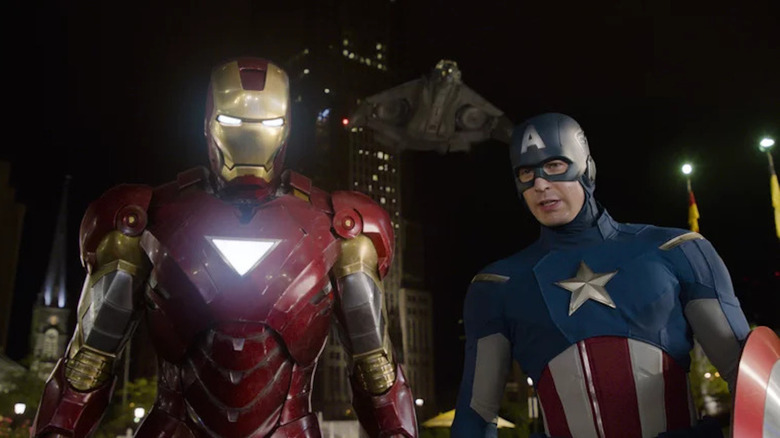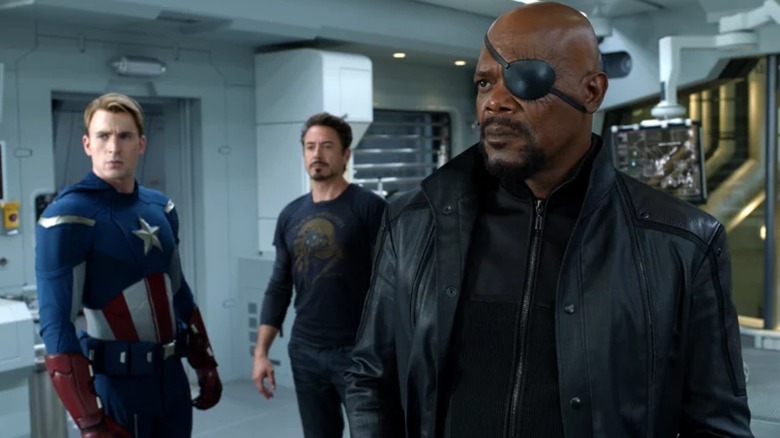Marvel's Avengers Had A Real-Life Falling Out With The Pentagon - Here's Why
Some of the funding for Marvel Studios' biggest hits has notoriously come from the United States Department of Defense, but when it came to 2012's original "The Avengers," the Department declined to partner with the studio, unable to understand its fictional politics.
The Pentagon has involved itself in Hollywood to a surprising degree over the years, contributing funds and equipment to recent hits like "Top Gun: Maverick." The relationship makes sense; movies cost a lot to make, and depicting the military is expensive. In exchange for veto power on scripts, the DoD provides access to military equipment, locations, and its own expertise. That works out when movies stick close to the real world, but what happens when a film involves superheroes from other planets and fictional branches of the American government?
As described in a 2012 expose from WIRED, the fictional politics of "The Avengers" confused the Defense Department's Phil Strub, a liaison to the project, ultimately leading his team to scrap their involvement. The issue was S.H.I.E.L.D., the shadowy organization helmed by Nick Fury (Samuel L. Jackson). "We couldn't reconcile the unreality of this international organization and our place in it," Strub said. "To whom did S.H.I.E.L.D. answer? Did we work for S.H.I.E.L.D.? We hit that roadblock and decided we couldn't do anything."
However, the Pentagon continued to fund other MCU projects, and their refusal to work on "The Avengers" was an outlier. All three "Iron Man" films received military support, and 2019's "Captain Marvel" launched alongside promotions for the U.S. Air Force.
The Defense Department couldn't wrap their minds around S.H.I.E.L.D.
The mutually beneficial relationship between Hollywood and the United States military has often come under scrutiny, with the MCU particularly criticized for its frequent reliance on Defense Department funds. Aside from a "thank you" credit, there's often not much indication that the government was involved in the making of a film — though the inclusion of cutting-edge fighter jets or other equipment might tip off perceptive viewers — and the Pentagon does not allow negative portrayals of its personnel or decision-making.
The reason "The Avengers" couldn't secure military funding was that S.H.I.E.L.D., whose members are shown as heartless pragmatists when they authorize a nuclear strike on New York City in the film's final act, wasn't shown to be definitively under the Pentagon's thumb. The Defense Department made a singular exception to its disinvolvement with the film. WIRED noted that in one scene portraying New York National Guardsmen helping police and firefighters during Loki's (Tom Hiddleston) Chitari invasion, the DoD allowed Humvees to be filmed.
On the other hand, Hollywood screenwriters and set designers don't usually have in-depth knowledge of how the military functions, so the expertise of Defense officials can be valuable. Additionally, plenty of MCU films have had agendas that those in Washington might not agree with, and some, like "Black Panther: Wakanda Forever," have portrayed the U.S. Military as antagonists, proving that the Pentagon doesn't meddle with impunity. Still, the military benefits heavily from its partnership with Hollywood. After "Captain Marvel" was released, Military.com bragged that the Air Force Academy saw its highest number of female applicants in half a decade. Meanwhile, the Navy and Air Force reportedly saw a 500% boost in recruiting following the release of "Top Gun: Maverick."

